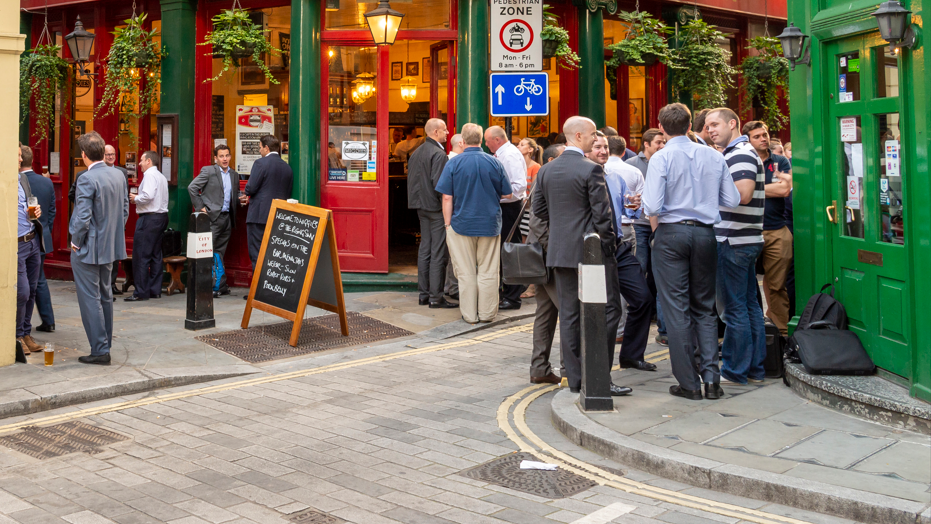After-work drinks in decline outside London, peers told

The committee heard Thursday is now the most popular night for pubs in central London
- Published
Home working appears to have led to a bigger decline in after-work drinking in city centres outside London, a Lords committee has heard.
Urban economist Paul Swinney told peers that pub spending data suggested that in the capital, post-work drinks have switched from Friday to Thursday.
But a similar shift could not be seen in other large British cities, he added, where spending in bars was more likely to shift into the weekend.
He also added that a decline in city-centre spending had not been matched by a similar increase for high streets outside urban centres.
- Published25 February
- Published11 November 2024
Mr Swinney, director of the Centre for Cities think tank, was among various experts giving evidence to a special House of Lords committee set up earlier this year to examine the impact of remote and hybrid working in the UK.
Last month, the think tank published research, external on the pre and post-pandemic spending patterns of city-centre workers in pubs and bars around their places of work, by comparing credit and debit card data from 2019 and 2024.
The analysis showed that during that period, the share of weekly spending in pubs in central London on Fridays fell, whilst on Thursdays it rose, making it the most most popular night of the week.
But a similar pattern was not seen in the data for nine other large British cities, including Glasgow, Liverpool, Bristol, Newcastle and Sheffield.
Surveys have shown Friday has become the most popular day for office workers to work from home, with attendance during the middle of the week returning to more similar levels to before the Covid pandemic.
'Shift to weekend'
Explaining the spending data to peers on Thursday, Mr Swinney said that in London "the Friday night drink hasn't so much gone away, it's just shifted to a Thursday".
"But when we looked at other large cities, that wasn't the case," he added.
"It appeared from the data that we have that the post-work drink has reduced in those other places.
"Actually the shift seems to go into the weekend, which seems to be workers coming in from a leisure perspective, rather than going out after work".
The data analysed by the Centre for Cities showed that 32% of weekly pub spending in big cities outside London now takes place on a Saturday, suggesting workers are more likely to return on weekends to socialise than in the capital.
Supermarket spending
Elsewhere in the session, Mr Swinney said a decline in city-centre spending since the rise in remote and hybrid working had not been matched by an equivalent rise in spending on "local High Streets".
"That might have happened a little bit, but certainly not to the extent that people were suggesting [during the pandemic]," he told the committee.
He added that suburban supermarkets had "probably been the biggest winner" from the shift in spending patterns since Covid.
He said more flexible working patterns had led to some immediate benefits for workers, including reduced travel cost and more flexibility.
But he added it could be "two, three, ten years down the line" before the long-term impact on economic productivity could be properly assessed.

Sign up for our Politics Essential newsletter to keep up with the inner workings of Westminster and beyond.